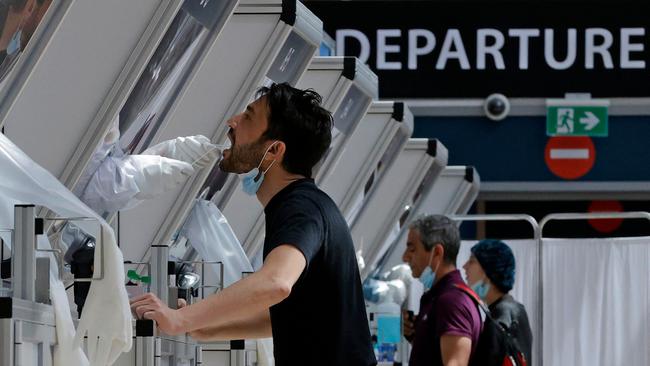Vaccination petri dish for the world gets life back on track
Israel is opening up its economy, following a world-beating vaccine rollout.

Israel is opening up its economy, following a world-beating vaccine rollout. Hotels, restaurants, cafes, gyms, pools, nightclubs, theatres and concerts have reopened for people who’ve been vaccinated. Schools are slowly reopening too, with fewer social distancing measures — and Israelis are loving it.
“It’s a miracle — there’s no other word for it,” says Diane Harkavy of Jerusalem. “Last year at the Passover meal we were just three: me and my husband and one daughter who was living at home. This year, there were 14 of us. All my daughters, their partners, my new granddaughter. Passover is about celebrating the passage from slavery to freedom and this year we really felt the freedom.”
Ms Harkavy has another reason to celebrate. She’s a swimmer and a regular at the YMCA gym. She describes returning after six months out of the water. “I feel this incredible sense of pride and joy when I swipe my card and go in. I think about the vaccine every day and I am so appreciative,” she said.
There are still restrictions in place, especially on indoor gatherings, but this progress is possible because of Israel’s high vaccination rates — more than 80 per cent of eligible Israelis over the age of 16 have received the Pfizer BioNtech vaccine.
Sharon Alroy-Preis, Israel’s top public health official who is behind its vaccine success, says there has been a dramatic decline in all indicators — infections, hospitalisations and deaths. “We’ve learnt that it’s doable. You can get to a point in this pandemic — and I think Israel is the first to show it — where you open sectors and the disease goes down. This is something that has not been shown anywhere in the world so far,” she said.
One of Jerusalem’s leading hospitals, Shaare Zedek, closed its COVID intensive care unit on Wednesday for the first time since opening it a year ago, and other hospitals are doing likewise.
Dr Alroy-Preis said the vaccines were achieving more in a short time than three national lockdowns. “What we know from our research is that vaccine effectiveness is between 97-98 per cent in reducing morbidity and 96 per cent in reducing mortality. It’s very, very efficient and we also know it’s safe,” she said. “We have given it to more than 5 million people and we see really minimal side effects around the time of the vaccination.”
There are no vaccine shortages here, unlike in other parts of the world, including Australia. That’s because Israel persuaded Pfizer that it would be a good place to conduct a national rollout trial. Israel’s advantages include an efficient, digitised public health system and its small size — less than one-third the area of Tasmania. Israel also agreed to share all its citizens’ medical data with Pfizer — and reportedly paid more than the company’s asking price.
Israel’s government was criticised for its management of the pandemic, but it has been praised for the vaccine campaign — a reversal of the situation in Australia. Dr Alroy-Preis said the main concern now was how to persuade the remaining 800,000 or so unvaccinated Israelis to have their shots. One strategy is the Green Pass.
YMCA Sport Centre manager Shaul Elkana said it opened on the first day restrictions began to be lifted and had seen a steady stream of returning customers, like Ms Harkavy, as well as new ones. “We are very strict about enforcing the government’s Green Pass restrictions, and our members say it gives them a sense of security,” he said.
Dr Alroy-Preis credits the Green Pass — part carrot and part stick — with getting younger people in to have their shots. She argues the majority of the Israelis who have yet to be vaccinated are “probably afraid” and hopes the statistics will reassure them.
“Ninety per cent of the people in hospitals now are either not vaccinated at all or did not complete all the protocols. So, we really see the effect of the vaccines. And I hope this will encourage the people who have not been vaccinated to go get their shots.”
Despite this success, Israel has been criticised for its failure to vaccinate the Palestinians in Gaza and especially the West Bank, where Jewish settlers are being vaccinated. Dr Alroy-Preis supports vaccinating Palestinians.
“I definitely support giving vaccines to our neighbours. I think we are here together. We fight the same virus. We also fight the same problems such as crowdedness. And so I think we need to help each other in these times,” she said.
“Part of the difficulty is with the arrangements that we have with Pfizer that states that we cannot take the vaccines out of Israel. And so what we’ve done so far is vaccinate Palestinians on the borders when they come into work. And we are trying to see how we can help more to our neighbours, because that’s part of what we need to do here.”
A third of Israel’s population is under 16 and cannot be vaccinated. Pfizer-BioNtech announced 10 days ago that its trials on those aged 12 to 16 had been successful. Officials have indicated they are likely to start vaccinating children over 12 from the end of May.



To join the conversation, please log in. Don't have an account? Register
Join the conversation, you are commenting as Logout